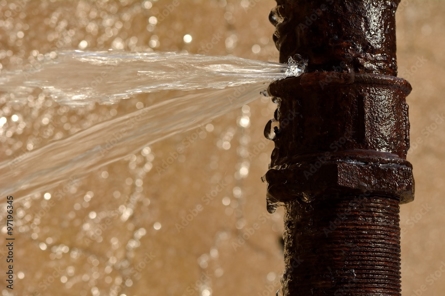In Omaha's extreme climate, preventing pipes from bursting requires careful attention and proactive measures. With temperatures regularly dropping below freezing in winter and soaring in summer, understanding how to protect your plumbing can save thousands in water damage repairs and prevent massive disruption to your home life.
Before you start: Know your vulnerable areas
Before implementing prevention strategies, you need to identify the areas most at risk in your home. In Omaha properties, pipes most likely to burst include those running along exterior walls, in unheated spaces like basements or crawl spaces, and outdoor plumbing fixtures exposed to freezing temperatures.
Older homes in neighborhoods like Dundee and Benson often have pipes in particularly vulnerable locations due to original construction methods. Check your unheated garage, basement rim joists, and pipes near foundation walls, as these areas face the highest risk during extreme temperature changes.
Strategy #1: Proper insulation
Proper insulation serves as your first defense against burst pipes. For exposed pipes in unheated areas, foam rubber or fiberglass insulation sleeves provide crucial protection. When applying insulation, ensure all joints and corners are completely covered, as these connection points often freeze first.
For pipes running through exterior walls, adding wall insulation can help maintain more stable temperatures. Consider installing pre-molded foam sleeves specifically designed for extreme temperature conditions. In particularly cold areas, adding a layer of aluminum foil wrap over pipe insulation helps retain heat.
Strategy #2: Temperature control
Maintaining consistent temperatures throughout your home significantly reduces burst pipe risks. Keep your thermostat set no lower than 65 degrees, even when you're away. For every 10 feet of pipe, a one-degree temperature difference can significantly impact freezing risk.
Allow warm air to circulate around pipes by keeping interior doors open between rooms and opening cabinet doors beneath sinks during cold snaps. This circulation helps maintain more uniform temperatures throughout your plumbing system, particularly important for pipes along exterior walls.
Strategy #3: Water pressure management
Excessive water pressure puts unnecessary stress on pipes and increases burst risks. Install a water pressure gauge to monitor your home's pressure levels - readings should stay between 40 and 65 PSI. Consider adding a pressure regulator if your readings consistently exceed these levels.
During severe cold spells, letting faucets drip can relieve pressure in the system. Focus on faucets connected to exposed pipes or those along exterior walls. Even a small trickle provides enough movement to help prevent freezing.
Strategy #4: Outdoor pipe protection
Remove, drain, and store garden hoses before winter arrives. Install insulated covers on exterior faucets and consider upgrading to frost-free models designed for severe weather conditions.
For irrigation systems, thoroughly drain all outdoor pipes and blow out any remaining water using compressed air. Cap or cover exposed pipe ends to prevent debris entry and protect against freeze damage.
Strategy #5: Extreme weather preparation
When severe cold hits Omaha, open multiple faucets throughout your home to keep water moving through the system. Focus on faucets furthest from your main water supply, as these lines often freeze first.
During extended cold periods, maintain consistent heat throughout your home. Keep garage doors closed to protect pipes in exterior walls, and seal any gaps or cracks that let cold air reach plumbing. If you have a crawl space, close all vents and insulate the access door.
Strategy #6: Year-round maintenance
Regularly inspect visible pipes for signs of wear, corrosion, or leaking. Check pipe supports and straps to ensure they're secure - loose pipes are more susceptible to damage from temperature changes and water hammer.
Keep your home's humidity at appropriate levels to prevent condensation on pipes. In summer, watch for signs of excessive pressure or temperature stress. Address any leaks promptly, as small problems can quickly escalate into major issues.
Emergency preparation essentials
Know your plumbing system's layout and the location of your main water shutoff valve. Label this valve clearly and ensure everyone in your household knows how to use it. During a pipe burst emergency, quick access to this valve can mean the difference between minor water damage and catastrophic flooding.
Keep basic pipe repair supplies on hand, including pipe wrap tape, rubber patches, and pipe clamps for temporary fixes until professional help arrives. Store these supplies in an easily accessible location, and include a detailed list of emergency plumbing contacts. Consider putting together an emergency kit with towels, buckets, and a wet vacuum to manage water until professional restoration services arrive.
When to seek professional help
While these prevention strategies are effective, some situations require professional expertise. Have a licensed plumber inspect your system if you notice recurring issues or want a comprehensive prevention plan tailored to your home's specific needs. Warning signs that warrant immediate professional attention include unusual sounds in your pipes, persistent drops in water pressure, or visible signs of pipe deterioration.
Professional inspection becomes particularly important for homes over 25 years old, as aging plumbing systems face higher risks of failure. Regular professional maintenance can identify potential problems before they lead to burst pipes, saving you from costly emergency repairs and water damage restoration. If you're unsure about implementing any prevention strategies, professional guidance ensures proper protection for your specific plumbing system.
Why trust ServiceMaster of South Central Omaha?
ServiceMaster of South Central Omaha understands the unique challenges Omaha homeowners face in preventing pipe bursts. Our experienced technicians can help identify vulnerable areas and implement effective prevention strategies.
Contact us today to learn more about protecting your home's plumbing system. Our team stands ready to help you prevent costly water damage from burst pipes.


